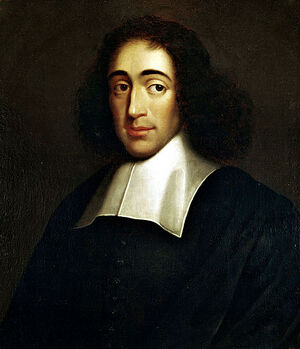Baruch Spinoza (nonfiction)
Baruch Spinoza (/bəˈruːk spɪˈnoʊzə/; Dutch: [baːˈrux spɪˈnoːzaː]; born Benedito de Espinosa, Portuguese: [bɨnɨˈðitu ðɨ ʃpiˈnɔzɐ]; 24 November 1632 – 21 February 1677, later Benedict de Spinoza) was a Dutch philosopher of Sephardi/Portuguese origin.
By laying the groundwork for the 18th-century Enlightenment and modern biblical criticism, including modern conceptions of the self and the universe, he came to be considered one of the great rationalists of 17th-century philosophy. Along with René Descartes, Spinoza was a leading philosophical figure of the Dutch Golden Age.
Spinoza's magnum opus, Ethics, was published posthumously in 1677. The work opposed Descartes' philosophy on mind–body dualism, and earned Spinoza recognition as one of Western philosophy's most important thinkers. In the Ethics, "Spinoza wrote the last indisputable Latin masterpiece, and one in which the refined conceptions of medieval philosophy are finally turned against themselves and destroyed entirely". Hegel said, "You are either a Spinozist or not a philosopher at all." His philosophical accomplishments and moral character prompted 20th-century philosopher Gilles Deleuze to name him "the 'prince' of philosophers."
Spinoza's given name, which means "Blessed", varies among different languages. In Hebrew, it is written ברוך שפינוזה. His Portuguese name is Benedito "Bento" de Espinosa. In his Latin works, he used Latin: Benedictus de Spinoza.
Spinoza was raised in a Portuguese Jewish community in Amsterdam. He developed highly-controversial ideas regarding the authenticity of the Hebrew Bible and the nature of the Divine. Jewish religious authorities issued a herem (חרם) against him, causing him to be effectively shunned by Jewish society at age 23. His books were also later put on the Catholic Church's Index of Forbidden Books.
Spinoza lived an outwardly-simple life as a lens grinder, turning down rewards and honours throughout his life, including prestigious teaching positions. He died at the age of 44 allegedly of a lung illness, perhaps tuberculosis or silicosis exacerbated by the inhalation of fine glass dust while grinding optical lenses. He is buried in the churchyard of the Christian Nieuwe Kerk in The Hague.
In the News
Baruch Spinoza @ Wikipedia
Fiction cross-reference
Nonfiction cross-reference
External links
- Baruch Spinoza @ Wikipedia

